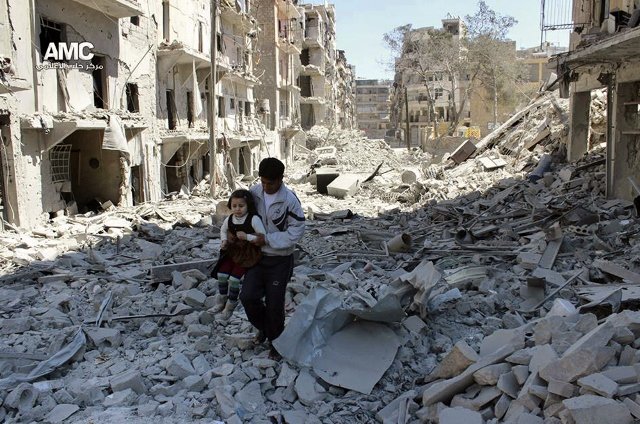Five and a half years after its civil war erupted, Syria descends into the abyss as the world watches. What lessons can we draw from this tragedy?

A Syrian man holding a girl surrounded by the rubble of houses destroyed by air strikes in Aleppo, Syria, 21 April 2014 (AP Photo/Aleppo Media Center AMC, File)
By far our most read post since we started publishing in mid-2015 is an article on the Syrian civil war headlined, “Why Syria is so important.”
It’s been a one year since we published this “decoder,” and we watch with dread as the situation in Syria deteriorates before the world’s eyes.
We asked News-Decoder correspondents for their views on the situation, which arguably remains the world’s most serious human rights tragedy, with huge geopolitical stakes that have only risen as the carnage worsens. We print their thoughts below.
“The psychic carnage will cast its shadow for decades.”
– by Alistair Lyon
You can look at Syria as a cockpit for regional rivalries or for the ambitions of globally oriented Islamist militants.
 You can gauge the impact of refugees on Syria’s neighbors and Europe; highlight how Russia has exploited the war for a grab at a bigger world role; or lament the impotence of the United States, the Europeans, the United Nations or indeed the Arab League to halt or even mitigate five years of conflict and savagery.
You can gauge the impact of refugees on Syria’s neighbors and Europe; highlight how Russia has exploited the war for a grab at a bigger world role; or lament the impotence of the United States, the Europeans, the United Nations or indeed the Arab League to halt or even mitigate five years of conflict and savagery.
Or you can set aside the geopolitics for a moment and consider the devastation inflicted on Syria’s pre-war population of 23 million.
More than quarter of a million have been killed and more than a million wounded. The conflict has forced 4.8 million Syrians to flee their country and 6.5 million more to leave their homes. According to United Nations figures, 80 percent of Syrians now live in poverty, life expectancy has plunged more than 20 years and school attendance has more than halved.
Behind the cold statistics lie immense pain and suffering, epitomized by the apocalyptic scenes from Aleppo. Syrians have been spared no crimes of war. Starvation sieges, mass torture, poison gas attacks, indiscriminate bombing of civilians and deliberate targeting of hospitals, to name just some of them.
In Aleppo, the Assad government and its Russian, Iranian and Lebanese Hezbollah allies now seem bent on annihilating the last rebel strongholds in Syria’s second city, along with the scores of thousands of civilians trapped there, before a new U.S. president can take office.
“We can expect new ugliness to arise.”
It all began in 2011 with a brave and peaceful revolt against decades of dictatorship. The government’s violent response prompted many to take up arms, and civil war took hold.
Neighbors became enemies. Everyone felt threatened. Disaffected Sunni Muslims took the brunt of Assad’s wrath. The rise of Islamist and Kurdish militias, some backed by Saudi Arabia, Qatar, Turkey or Western powers, helped drive many minority Alawites, Christians and Druze, as well as chunks of the Sunni majority, into the Syrian leader’s arms.
It is a stretch to see how Syria can hold together as a unitary state after all this, let alone one in which power is shared or devolved equitably under a government accountable to its people.
In any event, the war has traumatized and degraded millions of Syrians. Their pain and humiliation will be hard to heal. The psychic carnage will cast its shadow for decades, with repercussions for the Middle East and the rest of the world.
We can expect new ugliness to arise, not just in Syria, but also in Iraq, Libya, Egypt, Yemen, Palestine, where misrule, conflict or occupation have also scarred a generation or more. The region’s formidable economic and environmental difficulties further complicate any search for social peace.
The self-styled Islamic State caliphate may suffer defeat. But even if it loses its strongholds of Mosul in Iraq and Raqqa in Syria, that will not signal the end of jihadi violence, either in the Middle East or Western countries.
It will only metastasize into other forms, feeding off the perceived grievances and insecurities of Sunni Arabs in a swathe of the region where their overall numbers seem to mean little in the face of Shi’ite governments or armed movements backed by Iran.
Unless Sunnis get a solid political stake and a sense of dignity in Iraq and Syria, a minority will still be attracted to Islamist militancy.
***
‘The removal of the Cold War balance of power has unleashed ‘history.’
– by Jonathan Lyons
The Syrian crisis stands at the intersection of two dangerous fault lines in Western understanding of historical development.
 Celebrants of the so-called American Century and its glowing aftermath have argued that the collapse of the Soviet Union ushered in the “end of history,” characterized by final victory worldwide of neoliberal, democratic ideals and an accompanying end to local and regional conflict once fed by Superpower rivalry.
Celebrants of the so-called American Century and its glowing aftermath have argued that the collapse of the Soviet Union ushered in the “end of history,” characterized by final victory worldwide of neoliberal, democratic ideals and an accompanying end to local and regional conflict once fed by Superpower rivalry.
In fact, just the opposite is the case.
The removal of the Cold War balance of power has in fact unleashed “history” and allowed it to return, like water, to its natural level.
In the case of Syria, then, conflict that long simmered under the surface has now been freed to boil over with catastrophic consequences.
Syria has also exposed the second fault line: the West’s unwillingness to see that the root causes of the present civil and proxy wars underway are embedded in questions of religion and religious identity that must be resolved among the parties themselves before this sad historical chapter can truly “end.”
***
A red line in the sky?
– by Charles Aldinger
With diplomatic efforts now on a rubbish heap, no small part of the Syria importance equation is the growing question of what Washington and its Western allies might do militarily to try and stem Syrian and Russian bombing of civilians in Aleppo.
 There is talk in the U.S. Congress and among some analysts that the United States, Britain, France and others should declare a military-protected No-Fly Zone in the region.
There is talk in the U.S. Congress and among some analysts that the United States, Britain, France and others should declare a military-protected No-Fly Zone in the region.
But such a “red line in the sky,” many warn, would prompt Russia to openly challenge the zone with sophisticated anti-aircraft missiles and warplanes based in Syria, perhaps setting off deadly aerial clashes.
And, they caution, it could also trigger threatening military counter-moves by Russia against NATO near its borders and spin dangerously out of control in an already short-fused East-West relationship.
Alistair Lyon is former Middle East diplomatic correspondent for Reuters. During three decades at the news agency he covered conflicts as well as political and economic news in the Middle East and beyond. He began in Lebanon and headed bureaus in Jordan, Turkey, Pakistan/Afghanistan and Egypt/Sudan. He spent five years in London as Middle East diplomatic correspondent and five in Beirut as special correspondent, Middle East.
Jonathan Lyons served as a foreign correspondent and editor for Reuters for more than two decades, much of that time in the Muslim world. He is the author of three books on the region. He lectures frequently on the relationship between Islam and the West, and is currently working on a revisionist history of the Muslim world.
Charles Aldinger worked for four decades as a journalist, culminating with 23 covering the Pentagon, U.S. military affairs and international conflict and weaponry for Reuters. He reported from more than 60 countries traveling with U.S. defense secretaries. His UPI and Reuters experience included postings in Buenos Aires and Hong Kong. He reported on 1960s racial strife in the United States, revolutions, hurricanes, earthquakes, the U.S. Supreme Court and U.S. Congress.
